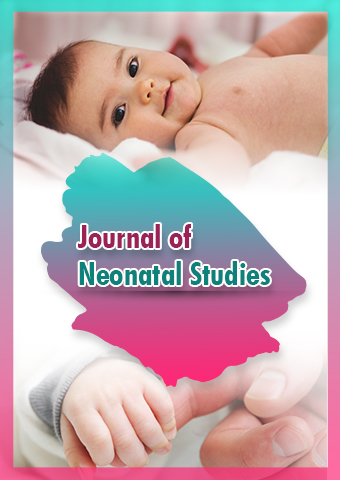Review Article - Journal of Neonatal Studies (2023) Volume 6, Issue 2
A Review on Neonatal Intensive Care Units
Fanos Vassilios*
Neonatal Intensive Care Unit, Puericulture Institute and Neonatal Section, Azienda Ospedaliera Universitaria, University of Cagliari, Monserrato, Cagliari, Italy
Neonatal Intensive Care Unit, Puericulture Institute and Neonatal Section, Azienda Ospedaliera Universitaria, University of Cagliari, Monserrato, Cagliari, Italy
E-mail: vassillosfan@edu.it
Received: 01-Apr-2023, Manuscript No. JNS-23-95934; Editor assigned: 3-Apr-2023, PreQC No. JNS-22- 95934(PQ); Reviewed: 17-Apr-2023, QC No. JNS-22-95934; Revised: 21- Apr-2023, Manuscript No. JNS-22- 95934(R); Published: 28-Apr-2023; DOI: 10.37532/jns.2023.6(2).23-25
Abstract
Neonatal Intensive Care Units (NICUs) are specialized medical facilities that provide round-the-clock care for critically ill new-borns. These infants require close monitoring and specialized medical attention due to their delicate health conditions. NICUs are equipped with advanced medical equipment and a team of experienced neonatal specialists to provide the best possible care for these infants. NICUs are generally equipped to care for premature babies, infants with congenital birth defects, or babies who require surgical intervention. Neonatal Intensive Care Units (NICUs) are specialized medical facilities designed to provide intensive care to new-born infants who are critically ill, premature, or require close monitoring due to medical or surgical conditions. NICUs are equipped with advanced medical technologies and skilled healthcare professionals who specialize in the care of new-born infants. The primary goal of NICUs is to provide the highest level of care to the most vulnerable and fragile patients. The specialized care provided in NICUs includes respiratory support, nutrition management, infection control, and monitoring of vital signs. NICUs also provide a range of diagnostic and therapeutic interventions, such as radiology, ultrasound, and surgery.
Keywords
Neonatal intensive care units • New-born • Specialized medical facilities • Medical or surgical conditions • Premature surgery • Radiology • Ultrasound
Introduction
A Neonatal Intensive Care Unit (NICU) is a specialized medical facility designed to provide intensive care to new-born infants, particularly those born prematurely or with serious medical conditions. NICUs are staffed by highly trained healthcare professionals and equipped with advanced medical technologies to provide round-the-clock care for these vulnerable new-born’s. These units are equipped with advanced medical technology and staffed by a team of healthcare professionals trained in neonatal care. NICUs provide a range of services, including respiratory support, feeding support, monitoring of vital signs, and treatment of infections. NICUs vary in level of care, with Level I providing basic care for healthy new-born’s and Level IV providing the highest level of care for the most critically ill new-born’s. NICUs play a critical role in improving the survival rates and overall health outcomes of premature and critically ill new-borns [1, 2].
Premature babies are born before 37 weeks of gestation and may require extra care and monitoring due to underdeveloped organs and other complications. Infants with congenital birth defects may require surgical intervention immediately after birth or may require specialized care to manage their health condition. NICUs are divided into different levels based on the level of care required for infants. Level I NICUs provide basic care for healthy new-borns or infants who require minimal medical attention. Level II NICUs provide specialized care for infants who require more monitoring and medical intervention than level I NICUs. Level III NICUs provide the highest level of care and are equipped to handle complex medical conditions, surgical interventions, and premature babies with very low birth weights. NICUs are staffed by a team of specialized neonatal nurses, neonatologists, and other medical professionals who work together to provide personalized care for each infant. Neonatal nurses play a vital role in the NICU as they are responsible for monitoring the infants’ vital signs, administering medications, and providing emotional support to families [3, 4].
Neonatologists are medical doctors who specialize in the care of new-born infants and provide specialized medical care to the infants in the NICU. Parents of infants in the NICU may experience a range of emotions, including fear, anxiety, and uncertainty. NICUs are designed to provide support to families and encourage parental involvement in the care of their infant. Parents are encouraged to visit their baby in the NICU and participate in their care by learning how to feed, change, and comfort their infant. NICUs are typically divided into levels based on the level of care they provide. Level I NICUs provide basic care for healthy newborns, while Level III NICUs offer the highest level of care for critically ill new-borns. Level II NICUs provide intermediate care for infants who require more specialized care than Level I NICUs, but not as intensive as Level III NICUs. The care provided in NICUs is often complex, requiring a multidisciplinary team of healthcare professionals, including neonatologists, nurses, respiratory therapists, pharmacists, and other specialists. The family of the new-born is also an integral part of the care team, and NICUs provide support to families, including education, counseling, and emotional support. Premature birth is one of the most common reasons why a baby may need to be admitted to a NICU. Premature babies, those born before 37 weeks of gestation, are at a higher risk for various health complications, such as respiratory distress syndrome, apnea, jaundice, and infections. They may also have underdeveloped organs and immature immune systems that make them more susceptible to illnesses. Therefore, NICUs provide a controlled environment that can help support these fragile infants [5, 6].
Discussion
Besides prematurity, other reasons why a baby may need to be admitted to a NICU include congenital anomalies (birth defects), infections, meconium aspiration, hypoglycemia, and perinatal asphyxia, among others. In these cases, the goal of the NICU team is to provide the best possible care and treatment to improve the baby’s health and prevent long-term complications [7].
NICUs are equipped with specialized equipment, such as incubators, ventilators, oxygen therapy devices, and Intra Venous (IV) lines, among others, to monitor and support the baby’s vital signs, breathing, and nutrition. The staff in a NICU is trained to handle all these devices and to adjust the baby’s care as needed, depending on their changing health status. Additionally, many NICUs also have advanced diagnostic equipment, such as ultrasound, MRI, and CT scanners, to aid in diagnosing medical conditions and monitoring the baby’s progress. The healthcare team in a NICU is made up of highly trained professionals, including neonatologists, neonatal nurse practitioners, registered nurses, respiratory therapists, social workers, and pharmacists, among others. These specialists work together to provide personalized care to each baby, based on their individual needs and medical condition. They closely monitor the baby’s vital signs, administer medications, provide nutrition, and offer emotional support to parents and family members. One of the biggest challenges for families with a baby in the NICU is the emotional toll it can take. Many parents feel anxious, overwhelmed, and uncertain about their baby’s future. NICUs often provide support services, such as counseling, support groups, and resources, to help parents cope with the stress and uncertainty of having a baby in the NICU. These services can be crucial in helping families adjust to their new reality and feel supported during this challenging time [8].
Conclusion
NICUs play a crucial role in providing specialized care for critically ill new-borns. They provide round-the-clock medical care and emotional support to families during a difficult time. The specialized medical equipment, experienced medical staff, and personalized care provided in NICUs contribute to the positive outcomes and improved health of these vulnerable infants. NICUs play a critical role in providing specialized care to new-born infants, improving their chances of survival, and reducing the risk of long-term health problems. The continued advancement of technology and medical knowledge will further enhance the quality of care provided in NICUs, ultimately leading to improved outcomes for the most vulnerable patients [9].
Neonatal Intensive Care Units (NICUs) play a crucial role in providing specialized medical care to critically ill new-born’s. NICUs are equipped with advanced medical technology, highly trained healthcare professionals, and a multidisciplinary team that works together to provide comprehensive care to premature or sick infants. The development of NICUs has significantly improved the survival rates and health outcomes of premature and critically ill infants, allowing them to receive specialized medical care in a safe and supportive environment. While the use of NICUs may be necessary in some cases, it is important to work towards reducing the need for NICU admissions through preventative measures such as maternal health education, early detection of risk factors, and access to prenatal care. Overall, NICUs have played a vital role in advancing neonatal medicine and improving the health and wellbeing of new-born’s, but efforts must be made to minimize their use and ensure that all new-born’s receive the care and support they need to thrive [10].
Acknowledgement
None
Conflict of Interest
None
References
- O'Farrell P, Ferreira N. Digital photography in orthopaedics: Ethical considerations. SA Orthop J. 15, 91-4 (2016).
- Brandl D, Prantl L. Fotodokumentation ästhetischer Behandlungen. Journal für Ästhetische Chirurgie. 12, 84-94 (2019).
- Arimany Manso J, Taberner Ferrer R, Pidevall I et al. Use of Photography in Dermatology: Ethical and Legal Implications. Actas Dermosifiliogr. 111, 107-14 (2020).
- Creighton S, Alderson J, Brown S et al. Medical photography: ethics, consent and the intersex patient. BJU Int. 89, 67-71 (2002).
- Grassberger M, Verhoff MA. Klinisch-forensische Fotodokumentation. Klinisch-forensische Medizin: Springer. pp: 127-38 (2013).
- Eichhorn C, Nagel E. Fotodokumentation. Prävention und Gesundheitsförderung. 4, 207-16 (2009).
- Karim RB, Hage JJ, Ahmed AK et al. Digital photography as a means of enhancing interconsultant communication in oncological cutaneous surgery. Ann Plast Surg. 48, 180-3 (2002).
- DeLange GS, Diana M. 35 mm film vs. digital photography for patient documentation: is it time to change? Ann Plast Surg. 42, 15-9 (1999).
- Galdino GM, Swier P, Manson PN et al. Converting to digital photography: a model for a large group or academic practice. Plast Reconstr Surg. 106, 119-24 (2000).
- de Almeida Geraldino R, Rezende L, da-Silva CQ et al. Remote diagnosis of traumatic dental injuries using digital photographs captured via a mobile phone. Dent Traumatol. 33, 350-7 (2017).
Indexed at, Google Scholar, Crossref
Indexed at, Google Scholar, Crossref
Indexed at, Google Scholar, Crossref
Indexed at, Google Scholar, Crossref
Indexed at, Google Scholar, Crossref
Indexed at, Google Scholar, Crossref

